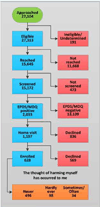Suicidal ideation in depressed postpartum women: Associations with childhood trauma, sleep disturbance and anxiety
- PMID: 26001587
- PMCID: PMC4458196
- DOI: 10.1016/j.jpsychires.2015.04.021
Suicidal ideation in depressed postpartum women: Associations with childhood trauma, sleep disturbance and anxiety
Abstract
Background: Suicide is one of the leading causes of death in postpartum women. Identifying modifiable factors related to suicide risk in mothers after delivery is a public health priority. Our study aim was to examine associations between suicidal ideation (SI) and plausible risk factors (experience of abuse in childhood or as an adult, sleep disturbance, and anxiety symptoms) in depressed postpartum women.
Methods: This secondary analysis included 628 depressed mothers at 4-6 weeks postpartum. Diagnosis was confirmed with the Structured Clinical Interview for DSM-IV. We examined SI from responses to the Edinburgh Postnatal Depression Scale-EPDS item 10; depression levels on the Structured Interview Guide for the Hamilton Depression Rating Scale, Atypical Depression Symptoms (SIGH-ADS); plus sleep disturbance and anxiety levels with subscales from the EPDS and SIGH-ADS items on sleep and anxiety symptoms.
Results: Of the depressed mothers, 496 (79%) 'never' had thoughts of self-harm; 98 (15.6%) 'hardly ever'; and 34 (5.4%) 'sometimes' or 'quite often'. Logistic regression models indicated that having frequent thoughts of self-harm was related to childhood physical abuse (odds ratio-OR = 1.68, 95% CI = 1.00, 2.81); in mothers without childhood physical abuse, having frequent self-harm thoughts was related to sleep disturbance (OR = 1.15, 95% CI = 1.02, 1.29) and anxiety symptoms (OR = 1.11, 95% CI = 1.01, 1.23).
Discussion: Because women with postpartum depression can present with frequent thoughts of self-harm and a high level of clinical complexity, conducting a detailed safety assessment, that includes evaluation of childhood abuse history and current symptoms of sleep disturbance and anxiety, is a key component in the management of depressed mothers.
Keywords: Anxiety; Childhood abuse; Postpartum depression; Sleep disturbance; Suicidal ideation.
Copyright © 2015 Elsevier Ltd. All rights reserved.
Similar articles
-
A prospective study of thoughts of self-harm and suicidal ideation during the postpartum period in women with mood disorders.Arch Womens Ment Health. 2013 Dec;16(6):483-8. doi: 10.1007/s00737-013-0370-y. Epub 2013 Jun 20. Arch Womens Ment Health. 2013. PMID: 23784481
-
The prevalence of suicidal ideation identified by the Edinburgh Postnatal Depression Scale in postpartum women in primary care: findings from the RESPOND trial.BMC Pregnancy Childbirth. 2011 Aug 3;11:57. doi: 10.1186/1471-2393-11-57. BMC Pregnancy Childbirth. 2011. PMID: 21812968 Free PMC article. Clinical Trial.
-
Combined effect of adverse childhood experiences and young age on self-harm ideation among postpartum women in Japan.J Affect Disord. 2019 Jun 15;253:410-418. doi: 10.1016/j.jad.2019.04.079. Epub 2019 Apr 17. J Affect Disord. 2019. PMID: 31103806
-
Anxious and depressive components of Edinburgh Postnatal Depression Scale in maternal postpartum psychological problems.J Perinat Med. 2013 Jul;41(4):343-8. doi: 10.1515/jpm-2012-0258. J Perinat Med. 2013. PMID: 23426862 Review.
-
Systematic review of the prevalence of psychiatric illness and sleep disturbance as co-morbidities of HIV infection in the UK.Int J STD AIDS. 2018 Jun;29(7):704-713. doi: 10.1177/0956462417750708. Epub 2018 Feb 2. Int J STD AIDS. 2018. PMID: 29393007
Cited by
-
Prevalence and factors associated with postpartum depression at a primary healthcare facility in Eswatini.S Afr J Psychiatr. 2019 Oct 24;25(0):1404. doi: 10.4102/sajpsychiatry.v25i0.1404. eCollection 2019. S Afr J Psychiatr. 2019. PMID: 31745444 Free PMC article.
-
Factors Related to Seeking Help for Postpartum Depression: A Secondary Analysis of New York City PRAMS Data.Int J Environ Res Public Health. 2020 Dec 13;17(24):9328. doi: 10.3390/ijerph17249328. Int J Environ Res Public Health. 2020. PMID: 33322171 Free PMC article.
-
Women with perinatal suicidal ideation-A scoping review of the biopsychosocial risk factors to inform health service provision and research.PLoS One. 2022 Sep 28;17(9):e0274862. doi: 10.1371/journal.pone.0274862. eCollection 2022. PLoS One. 2022. PMID: 36170289 Free PMC article.
-
An integrated community mental healthcare program to reduce suicidal ideation and improve maternal mental health during the postnatal period: the findings from the Nagano trial.BMC Psychiatry. 2020 Jul 29;20(1):389. doi: 10.1186/s12888-020-02765-z. BMC Psychiatry. 2020. PMID: 32727420 Free PMC article.
-
Lived experiences of Ugandan women who had recovered from a clinical diagnosis of postpartum depression: a phenomenological study.BMC Pregnancy Childbirth. 2021 Dec 13;21(1):826. doi: 10.1186/s12884-021-04287-2. BMC Pregnancy Childbirth. 2021. PMID: 34903199 Free PMC article.
References
-
- Altemus M, Cloitre M, Dhabhar FS. Enhanced cellular immune response in women with PTSD related to childhood abuse. American Journal of Psychiatry. 2003;160:1705–1707. - PubMed
-
- Anda RF, Felitti VJ, Bremner J, Walker JD, Whitfield C, Perry BD, Dube SR, Giles WH. The enduring effects of abuse and related adverse experiences in childhood: A convergence of evidence from neurobiology and epidemiology. European Archives of Psychiatry and Clinical Neuroscience. 2006;256:174–186. - PMC - PubMed
-
- Angst J, Gamma A, Rossler W, Ajdacic V, Klein DN. Long-term depression versus episodic major depression: Results from the prospective Zurich study of a community sample. Journal of Affective Disorders. 2009;115:112–121. - PubMed
-
- Battle CL, Shea MT, Johnson DM, Yen S, Zlotnick C, Zanarini MC, Sanislow CA, Skodol AE, Gunderson JG, Grilo CM, McGlashan TH, Morey LC. Childhood maltreatment associated with adult personality disorders: findings from the Collaborative Longitudinal Personality Disorders Study. Journal of Personality Disorders. 2004;18:193–211. - PubMed
Publication types
MeSH terms
Grants and funding
LinkOut - more resources
Full Text Sources
Other Literature Sources
Medical


